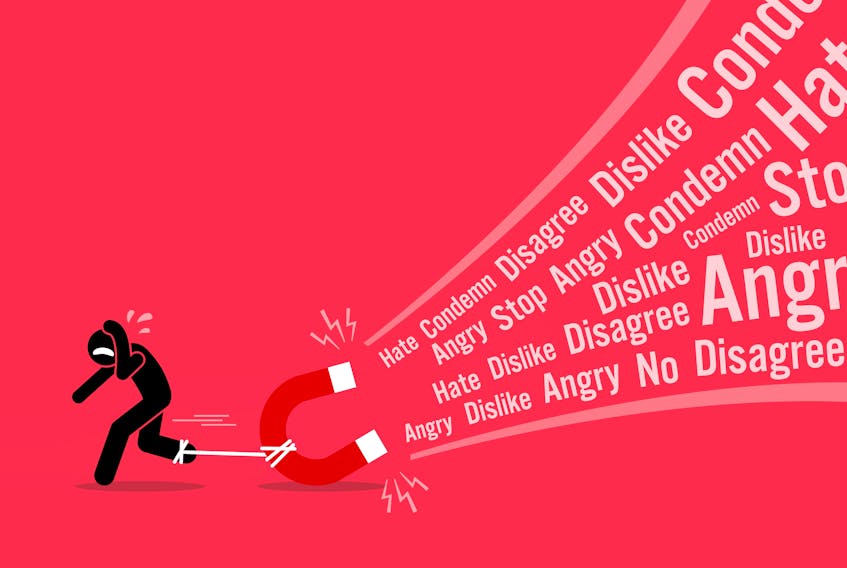Is public discourse dead, or is it just dying?
And if it is dead, where do we go from here?
What’s going to replace it?

Private discourse, as far as I know, is still close to fine; you can still get together (to the extent current rules allow) and talk back and forth, politely disagree, offer up evidence, and if you don’t persuade, you can at least make your point. (To be fair, most often, that’s private discourse with friends, or at least acquaintances, who often share similar world views.)
But public discourse?
It’s more and more like a drive-by shooting with words instead of bullets.
I’ve been in the media for more than 30 years. I’ve grown accustomed to people dismissing detailed, thorough work with the simple backhand of “fake news” or “lamestream media” without ever bothering to point out a single error or false assumption in the work they’re so casually dismissing.
But that technique has spread so much further now that it’s the rule, rather than the exception — put your fingers in your ears, yell as loud as you can, and call it “the conversation.”
I blame it on a couple of things, including technology. There’s the sheer, near-instantaneous speed of responses, along with the ease of being able to have a big footprint despite making only the smallest of efforts. Social media gives big reach and also requires fast turnaround — you want to get your shots in before someone else out there in the world thinks of the same words or phrases.
In addition to public discourse moving fast, it also cares so little for those who you don’t agree with — it’s perhaps trite to use this example, but we’re doing our easy word-warfare with the equivalent of unmanned drones. You never have to see the harm you’re doing up close — or at all. You can bully endlessly, and never see the tears.
But also, there was a time when the available technology took time, and time meant care, or, if not care, at least time for a little reflection. My mother used to read editorials in the Halifax Chronicle Herald, become enraged and then dash off quick, angry letters, and then let those letters sit on the table next to her television chair for a full day before sending them. They almost always received a substantial and more measured edit, and, after editing, she would then wait for another day, and another read-through, before she mailed them.
In addition to public discourse moving fast, it also cares so little for those who you don’t agree with — it’s perhaps trite to use this example, but we’re doing our easy word-warfare with the equivalent of unmanned drones.
Other responses in the public sphere were equally slow and, I’d argue, more thoughtful.
Now, social media responses come so quickly that people can’t even be bothered to do the most basic proofreading on spelling, let alone taking the time to marshal facts to back up their arguments.
And if those arguments don’t work, the quick option is outright dismissal. Swamp the person you don’t like with hateful invective. Contact anyone who shares your point of view and get them to launch attacks in the same way, until the sheer volume of hate causes your victim to flee the field — and then call that a win, despite the fact it’s the hollow victory of grade-school kids circling their victim and chanting “greasy hair, doesn’t care” until the intended victim’s crying.
It’s strange how people who would normally say they despise bullying take part in it so often from their keyboards. Lots to be proud of there.
And that’s transferring into the larger public sphere as well. The simplest way for public figures to deal with arguments they dislike is now to simply dismiss those arguments as false — even if that means telling a direct lie — and hope that enough people are willing to blindly agree, primarily because it suits their existing beliefs. Heaven forbid we allow anyone to actually challenge the “rightness” of our existing outlook.
I fear where we’re heading.
Facts matter. Basic, polite, thoughtful discourse matters. Listening to points of view you don’t necessarily agree with matters as well.
If we don’t use our abilities to think and ponder and, yes, even be persuaded towards new views, we’re going to get played by leaders and politicians who realize that pandering to dogmatic “believers” means an easy win, and continuing, unquestioning support.
Look around you. It’s happening now.
Russell Wangersky’s column appears in SaltWire newspapers and websites across Atlantic Canada. He can be reached at [email protected] — Twitter: @wangersky.









